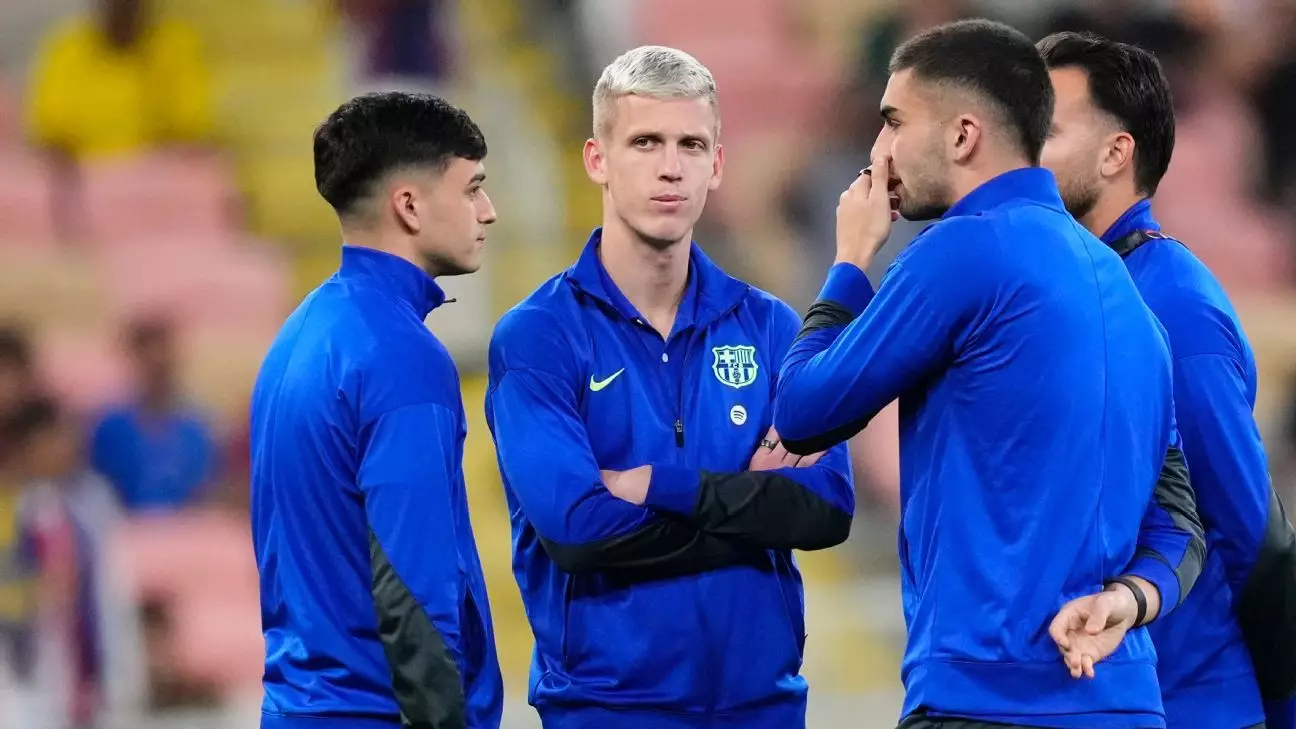The recent uproar surrounding FC Barcelona’s ability to register Dani Olmo and Pau Víctor for play has ignited tension within the Spanish football landscape. Following the club’s inability to meet the December 31 deadline set by LaLiga and the Royal Spanish Football Federation (RFEF) for compliance with financial fair play regulations, the situation has plunged into controversy. The temporary registration granted by Spain’s Sports Council (CSD) was met with fierce criticism from rival clubs, particularly Athletic Club, which has voiced concerns about fairness and integrity in the competition.
Athletic Club’s president Jon Uriarte did not hold back in his condemnation of the CSD’s decision to allow Olmo and Víctor onto the field despite Barcelona’s previous failures to comply with regulatory requirements. Referring to the provisional measures as “grotesque,” Uriarte underscored the inconsistencies that seem to permeate the structure of Spanish football governance. His comments reflect a sentiment shared by many in football; rules established to maintain equilibrium in the league appear to be selectively applied, which threatens the foundational principles of fair play.
The criticism from Athletic Club also serves a dual purpose; while addressing the broader implications of the CSD’s ruling, it simultaneously positions the club as a voice for equitable practices in football. Uriarte’s remarks emphasized the overarching frustration with a system that demands adherence to strict regulations while allowing for exceptions that seem to favor larger clubs with more resources, like Barcelona.
In stark contrast to the criticisms levied by Athletic Club, FC Barcelona’s sporting director, Deco, defended the club’s integrity. His assertion that “every club has their own issues” suggests a level of indifference to the grievances expressed by Athletic Club, proposing that such concerns should be viewed as intrinsic to the competitive nature of professional football. By emphasizing that the CSD’s decision was backed by a reason, Deco encapsulates a broader perspective that legal and administrative mechanisms sit at the heart of the sport’s governance — a viewpoint that may resonate with fans who prioritize successful navigation of regulatory landscapes over strict adherence to perceived fairness.
Barcelona’s stance reflects a tendency within high-profile clubs to leverage their influence when it comes to regulatory issues. Their focus on operational autonomy might resonate well within their fan base but equally alienates rivals who question the legitimacy of such measures. In a sport where the line between competition and legal framework often blurs, Deco’s comments raise pertinent questions regarding the nature of proprietary tactics employed by football clubs.
As players, clubs, and governing bodies grapple with the implications of this controversial registration issue, a chorus of discontent is growing in the streets and stadiums of Spain. Athletic forward Iñaki Williams, among others, has raised concerns that such incidents could “tarnish” the reputation of Spanish football. This sentiment captures a larger unease regarding how these events shape public perception of the sport. If the rules are perceived as flexible or lenient towards certain teams, the ethos of competition becomes compromised, painting Spanish football in a divisive light.
Meanwhile, LaLiga president Javier Tebas weighed in, questioning the apparent complicity of certain media outlets, particularly Real Madrid TV, in what seems to be a select silence on the matter. Tebas’ pointed remarks indicate a growing frustration with the narrative surrounding this registration issue, suggesting that the silence from significant football voices could contribute to the tarnishing of the league’s image — a sentiment echoed by many in football.
Moving forward, the conversation around registration issues must extend beyond the confines of individual club concerns to address the systemic issues that challenge the integrity of Spanish football. The underlying principles of fair competition should be non-negotiable, forming the backbone of a sport that thrives on the unpredictability of competition.
As football continues to evolve and financial pressures mount, vigilance is essential to ensure that governance remains transparent and fair. A recalibration of expectations, alongside stricter adherence to regulations, could help reignite trust among clubs and fans alike. Ultimately, Spanish football benefits from a collective commitment to fairness, wherein every participant operates under the same set of laws, allowing the sport to flourish unencumbered by suspicion or controversy.

